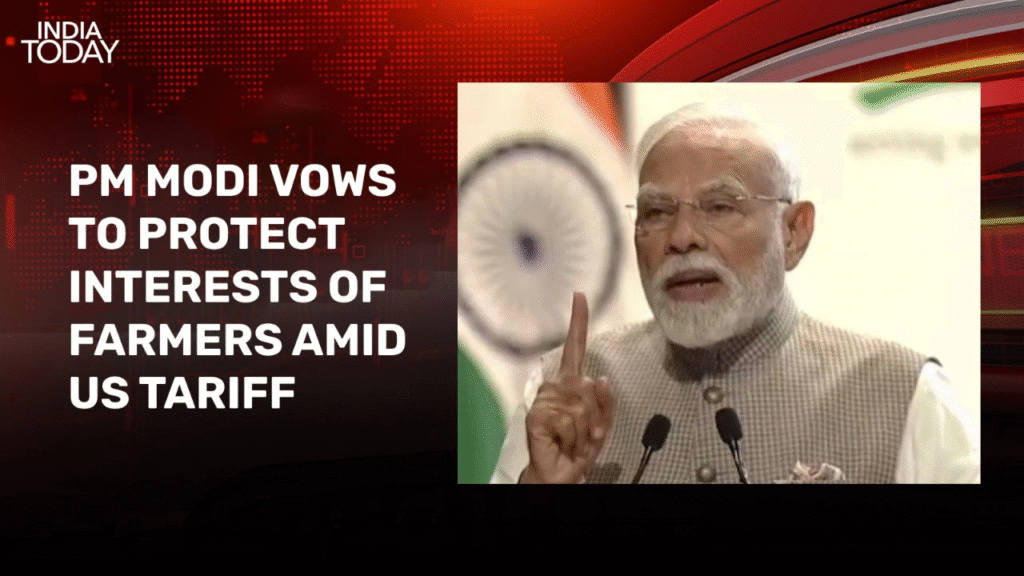Modi Vows to Protect Indian Farmers Despite Trump’s Additional 25% Tariff | India-US Trade Tensions 2025
"Modi Vows to Protect" declares readiness to pay a heavy price to safeguard Indian farmers’ interests amid escalating trade tensions following US President Trump's imposition of an additional 25% tariff on Indian goods. Explore the impact on India’s agriculture and trade relations with the US.
In a strong response to the latest escalation in trade tensions between India and the United States, Prime Minister Narendra Modi declared that India is prepared to pay a “heavy price” to protect the interests of its farmers.
This statement came a day after US President Donald Trump doubled the tariffs on Indian goods to 50% by imposing an additional 25% tariff, targeting India’s continued purchase of Russian oil.
Modi’s Firm Stand on Farmer Welfare
Speaking at the MS Swaminathan Centenary International Conference, Prime Minister Modi emphasized that the welfare of farmers, fishermen, and dairy farmers remains the top priority for India.
He stated unequivocally, “India will never compromise on the interests of farmers, fishermen, and dairy farmers. I know I will have to pay a heavy price for this, and I am ready for it.” This declaration underscores the Indian government’s commitment to its agricultural sector amidst mounting international pressure and economic challenges.
Background of the Trade Dispute
The US government’s decision to impose a 25% tariff over the existing 25% levy was a direct response to India’s ongoing oil imports from Russia, which Washington perceives as undermining US-led efforts to isolate Russia diplomatically and economically.
This development marks the highest tariff rate imposed by the US on any of its trading partners, significantly impacting India’s export economy.
India’s refusal to yield on opening its vast farm, fisheries, and dairy markets in bilateral trade talks has been a key sticking point in recent negotiations with the US.
The tariff hike reflects Washington’s tough stance aimed at addressing trade imbalances and strategic geopolitical concerns.
Economic and Sectoral Impact
The additional tariffs are expected to add considerable cost burdens on Indian exporters, making goods such as seafood, textiles, gems, jewelry, and auto parts less competitive in the US market.
Industry experts warn that the tariff increase could reduce Indian exports to the US by as much as 40-50%, hitting labor-intensive sectors particularly hard. This could lead to halted production, reduced orders, and job losses in export-dependent industries.
Moreover, the seafood sector, crucial to many farmers and coastal communities, sees this tariff escalation as a “doomsday” event, fearing significant revenue losses that could adversely affect livelihoods linked to farming and allied activities.
India’s Diplomatic and Strategic Response
Following the tariff increase, India has called the additional US duties “unfair, unjustified, and unreasonable” and vowed to take all necessary steps to protect national interests.
The Indian Ministry of External Affairs reiterated that India’s imports of Russian oil are based on market factors and aimed at securing energy needs for over 1.4 billion people.
While the tariff hike poses immediate challenges, the provisions include a 21-day window before the additional tariff takes effect, allowing room for diplomatic engagement.
India is expected to continue balancing its priorities—safeguarding farmers’ welfare while navigating complex geopolitical and trade negotiations.
Conclusion
Prime Minister Modi’s bold stance reflects India’s prioritization of its agricultural community despite external pressures and economic repercussions.
As India faces one of the most stringent tariff regimes from the US, it remains determined to uphold the interests of its farmers, fishermen, and dairy producers.
This unfolding trade saga emphasizes the intricate ties between trade policy, geopolitics, and domestic welfare priorities, with India prepared to bear the costs for long-term sovereignty over its agricultural policies.
